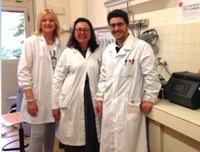The Unibo test for colon-rectal cancer prevention: efficient and non-invasive
A research group of the University of Bologna developed a diagnostic test that simply involves a one-millimetre blood sample a new study shows that this test is highly sensitive and highly capable of distinguishing healthy from at-risk patients.

A small amount of blood is enough for an early diagnosis of the colon-rectal cancer, which is one of the most common types of cancer in the world. A research group of the University of Bologna got further validation for the efficacy of a diagnostic test which allows for reliable results in a simple non-invasive manner.
This new study was published on the Journal of Advanced Research and analyzed this test efficacy by examining a group of patients who tested negative with the most common screening test for colon-rectal cancer, the faecal occult blood (FOB) test. "This new method is quick, reliable, efficient and convenient" says Rossella Solmi, one of the authors of the study and researcher at the University of Bologna. "The results of this study and the data we had previously obtained confirm that this test is highly sensitive and highly capable of distinguishing healthy from at-risk patients".
Colon-rectal cancer is the third most common oncological disease in the world and the second one in terms of deadliness. In 2018 1.8 million people were diagnosed with this cancer and 880,000 people died because of it. The best defence is prevention, which now is by faecal occult blood (FOB) test for spotting non-visibly apparent blood in the faeces. If the result of this test is positive, the next step is colonoscopy, which provides a reliable diagnosis.
The new test developed by researchers at the University of Bologna could be added to screening programmes for colon-rectal cancer. All that it takes is one millilitre of blood. This test analyses the level of expression of four genetic markers (CEACAM6, LGALS4, TSPAN8 e COL1A2, in one acronym: the CELTiC markers) that are tied to the presence of the disease.
A bioinformatic analysis identified the markers and their efficacy was then tested with satisfactory outcomes on a group of healthy patients and one group of patients with colon-rectal cancer. Then, a group of patients who tested positive with the FOB test and underwent colonoscopy were also checked. This analysis showed the ability of this test of distinguishing healthy patients from false-positives and to identify those who presented lesions that may cause the disease.
This new study allows for a further step forward in trialling this diagnostic test. "Our aim was to check the test for its ability of identifying subjects who tested negative to the FOB test", says Rossella Solmi. "We did this by involving 174 volunteers, whom I'd like to thank for their vital contribution". Once again, the trials showed the efficacy of the test as well as new crucial information. "Comparing FOB-negative patients with groups previously analysed by different studies confirmed the CELTiC panel effectiveness in identifying both those patients who showed serious lesions and cancer, and those whose FOB test was a false-positive", explains Solmi. "Moreover, these new data allowed us to pave the way for obtaining the threshold values of the genetic expression of the four markers in completely healthy subjects in a 50 to 70 age range. Finally, we were also able to detect interesting differences in the genetic expression of some of those markers in connection with age and sex".
This new test developed at the University of Bologna confirms its potential for diagnosis and could prove to be a strategic tool to enlarge the pool of people for preventive screening of this life-threatening disease.
The Journal of Advanced Research published this study with the title “Colorectal cancer screening: Assessment of CEACAM6, LGALS4, TSPAN8 and COL1A2 as blood markers in faecal immunochemical test negative subjects” carried out by a research group at the University of Bologna.
The authors of the study are Enea Ferlizza, Rossella Solmi, Gabriella Mattei, Michela Sgarzi and Mattia Lauriola from the Department of Specialistic, Diagnostic and Experimental Medicine, together with Rossella Miglio and Elena Nardi from the Department of Statistical Sciences “Paolo Fortunati”. Doctor Daniela Solmi and doctor Maria Carmen Biffoni from the Analysis Lab "Sant'Antonio" in Bologna also collaborated to the study. The project was developed thanks to Enzo Piccinini Foundation.
